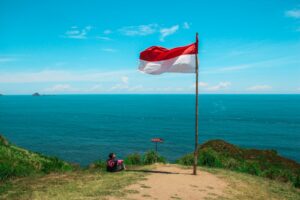New eLearning programme will help global leaders to reduce plastic pollution
In honour of World Oceans Day, scientists share research with global leaders to help to reduce plastic pollution.
In the eLearning programme, officials and leaders in the Asia-Pacific region will have the opportunity to learn from the scientists who have developed the latest techniques to track and monitor plastic in the waste system in order to identify where it ‘leaks’ into the environment.
Rapid urban development in the Asia Pacific region is straining the capacities of the existing waste management systems.
Uncollected waste is therefore often openly burned, releasing harmful emissions. Or it ends up in the environment where some of it enters the world’s marine ecosystems.
It is estimated that about 11 million tonnes of plastic pollution enter the world’s seas each year.
The eLearning course is free, and participants can work through the material at their own pace. It is expected to take about 12 hours to complete and participants are awarded a certificate.
The initiative is being led by the United Nation’s Economic and Social Commission for Asia and Pacific (ESCAP) and is funded by the Japanese government.
Dr Stefanos Fotiou, director of environment and development at ESCAP, said: ’The south east Asian region is in the spotlight when it comes to marine litter prevention. There are solutions, but we are running out of time and must work together if we are to protect our oceans and meet the ambitions of the 2030 Agenda for Sustainable Development.
‘We see that local governments have the passion and drive to rise to this challenge. ESCAP’s goal with this knowledge-building is to train on the best available technologies and practices so that science-based strategies can be implemented, and the region can achieve plastic-free waterways before it’s too late.”‘
Dr Costas Velis, an expert in environmental engineering said: ‘Before you can begin to tackle plastic pollution you have to understand its scale and dynamics. Once you have that picture, you can then begin to put in place systems for tackling the problems, and the ISWA plastic pollution calculator also enables governments to monitor the progress they are making. They can set goals and measure progress towards them.
‘That way, we can move to substantial reductions in plastics ending up in our land, freshwaters and seas.’
Photo credit – Naja Bertolt Jensen











